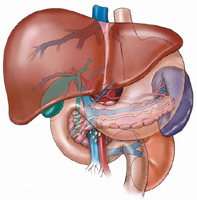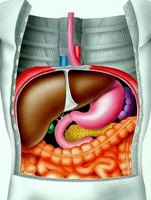Liver failure - an extremely dangerous state, often threatening a person's life. About the reasons and consequences of hepatic failure, read this article.
Content
How and why liver failure develops
Loading insufficiency - a pathological condition characterized by a violation of one or more liver functions, leading to disorders of various types of metabolism and intoxication of the body with protein metabolic products, which is often accompanied by violations of the central nervous system, up to the development of the hepatic coma.
The cause of liver failure can be the lesion of the basic liver tissue (the so-called endogenous renal failure) or a violation of hepatic blood flow, as a result of which the blood saturated with toxic substances comes from the portal vein directly into the total blood row, bypassing the liver (the so-called exogenous liver failure). In most cases, both mechanisms (mixed liver failure) occur in the development of hepatic insufficiency, but the decisive role belongs to the defeat of parenchyma.
Liver failure can be the outcome of many diseases and lesions of the liver, accompanied by extensive dystrophic, necrotic or fibrous changes in its main fabric. It is observed during acute and chronic hepatitis of various etiologies, hepatosis, cirrhosis, toxic liver dystrophy, as well as in violation of blood circulation in the liver (for example, during sepsis, burns, massive blood loss, pulley vein thrombosis), etc.
 Provoke the development of hepatic insufficiency or contribute to its progression in patients with hepatic pathology can:
Provoke the development of hepatic insufficiency or contribute to its progression in patients with hepatic pathology can:
- alcohol consumption;
- reception of drugs;
- anesthesia;
- Operational interventions;
- acute infectious processes and exacerbations of chronic;
- peritonitis;
- gastrointestinal bleeding;
- Excessive protein food consumption;
- irrational use of diuretics;
- joining renal failure;
- constipation or shortcuts.
In patients with hepatitis and cirrhosis of the liver, liver failure can develop due to the exacerbation of the process, as well as due to infections, the development of peritonitis, carious vein thrombophlebitis, other complications.
What is dangerous liver failure
Violations occurring in the body, and especially in the central nervous system, during liver failure, caused by the accumulation in the blood of a number of substances, in particular ammonia, which are not neutralized in the liver functionality, as well as the shears of acid-alkaline equilibrium and water and electrolyte balance, Near other factors. As a result, the content of amino acids and oxidation products increases in the blood and tissues of the body.
Acute hepatic insufficiency is characteristic of acute liver diseases complicated by extensive destructive changes. It can be observed, for example, with acute viral hepatitis, toxic liver dystrophy, acute frustration of its blood supply. There is a deterioration in the general condition, intoxication and jaundice increases. Patients disappear appetite, Ikota, nausea, vomiting, often hemorrhagic syndrome, the body temperature rises. With the progression of hepatic insufficiency, visual and auditory hallucinations, dizziness, fainting, characteristic of speech slowdown, the stereotype of the answers, clapping the tremor of the fingers of the hands (resembles the wings of the wings). Pains appear in the right hypochondrium, «hepatic» The smell of mouth is reduced in the size of the liver, which is the foresight of the hepatic coma.
The final period of the hepatic encephalopathy is characteristic of the confidence of consciousness, manifested by a violation of orientation in place and time, the stereotype of excitation (motor concern, repeated monotonous exclamations). Actually coma is characterized by the lack of consciousness, but at first the reaction to the pain remains, with deep hepatic coma it disappears. Deep Coma is developing extremely quickly and is often complicated by the threatening life of violations of the functions of many organs and systems.
Chronic liver failure develops gradually in patients with chronic liver diseases (with chronic hepatitis, liver cirrhosis, etc.). It manifests itself mainly by the same symptoms as acute, but neuropsychiatric disorders are transient and do not usually reach the degrees of deep coma. Patients may have a decrease in memory, depression, drowsiness imposing insomnia, or, on the contrary, anxiety, periodic states with loss of orientation, stunning, inadequate behavior. The progression of chronic liver failure, which is often associated with gastrointestinal bleeding, addition of infection and the action of other provoking factors, can, as well as acute hepatic insufficiency, lead to hepatic coma.









